Home Remedies For Pneumonia: 21 Effective Natural Treatments
Tackle the symptoms and prevent pneumonia infection with these tips and picks.
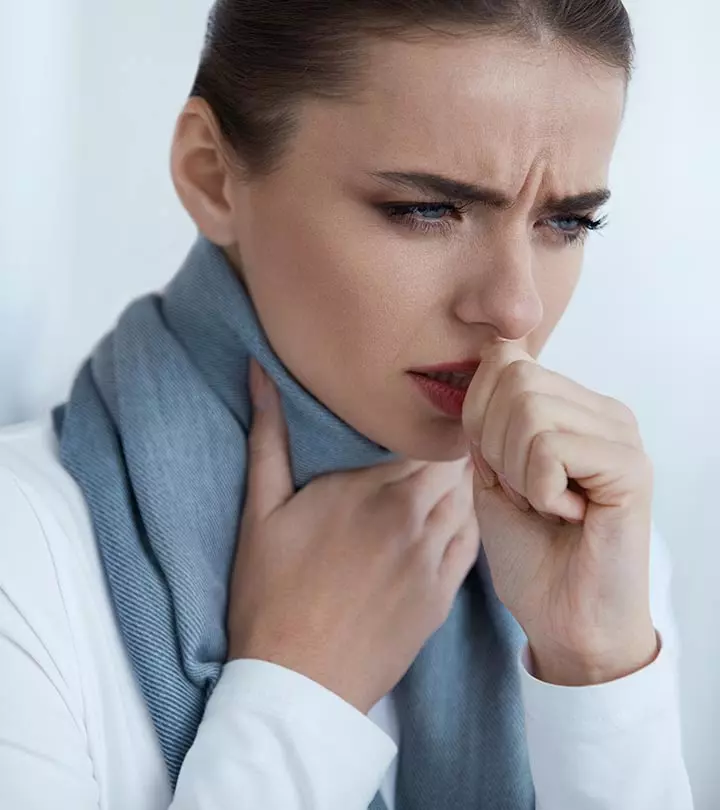
Image: shutterstock
While pneumonia can start with symptoms similar to the common cold, things can get out of hand quickly if not managed well. That is why if you are still not sure, it is better to keep things under control with some of these home remedies for pneumonia. While sneezing, wheezing, breathlessness, and running a high fever can hint at a pneumonia infection, it may or may not be so. But since this condition is contagious and could be life-threatening as well, you should better help arrest the progress of pneumonia in its early stages. To help you get started, we have listed some effective natural remedies for pneumonia treatment and management. Scroll down.
In This Article
What Is Pneumonia?
Pneumonia is a microbial infection that can affect one or both of your lungs. This infectious condition has the potential to make you very sick by causing inflammation of your lungs, which get filled with fluid or phlegm. Individuals affected by a cold or flu are more likely to develop pneumonia owing to the weakened state of their lungs.
A study conducted on the prevalence of community-acquired pneumonia found that the annual incidence is 24.8 cases per 10,000 adults. The mortality rate of pneumonia is as high as 23% and is the eighth leading cause of death.
Jennifer Schmidt, a blogger, shared her experience with pneumonia, which significantly impacted her life. She fell seriously ill with pneumonia, affecting her left lung and leading to a loss of 25 lbs. over two weeks. She wrote, “In addition, pneumonia has left me with difficulty breathing. And when I am doing something strenuous, I am winded much quicker and I experience coughing fits as a result.” The experience prompted a shift in mindset, making her appreciate life, let go of uncontrollable factors, and focus on personal growth (i).
Pneumonia is classified into different types based on what germs caused it, where it was acquired and how. Let us take a look at the same below.
Key Takeaways
- Pneumonia affects the lung due to a bacterial or viral infection and fills the air sac with fluids.
- Apple cider vinegar reduces inflammation and fights against pneumonia-causing bacteria and viruses.
- Vaccines and antibiotic treatments are the best ways to treat pneumonia.
- Medical treatment is necessary if your symptoms persist over a few days before it proves life-threatening.
Types Of Pneumonia
Based On Germs
- Bacterial Pneumonia: Certain bacteria like Streptococcus pneumoniae, Chlamydophila pneumoniae, and Legionella pneumophila cause penumonia.
- Viral Pneumonia: Respiratory viruses are another common cause of pneumonia. However, viral pneumonia is not as serious as bacterial pneumonia. Influenza A and B viruses are the main cause of pneumonia in adults, and the main cause of viral pneumonia in infants is the Respiratory syncytial virus (RSV).
- Mycoplasma Pneumonia: Mycoplasma pneumonia is caused by a genus of bacteria called Mycoplasma pneumoniae. This bacterial species lacks a cell wall and hence remains unaffected by most over-the-counter antibiotics.
- Fungal Pneumonia: This type of pneumonia is mainly caused by fungi that are present in the soil or bird droppings. Fungal pneumonia easily affects those who have chronic diseases or weak immune systems.

Based On Where It Was Acquired (Location)
- Hospital-Acquired Pneumonia: If you develop pneumonia during a hospital stay, it is referred to as hospital-acquired pneumonia.
- Community-Acquired Pneumonia: This type of pneumonia is usually acquired in a public place and not in a hospital or institutional setting.
Based On How It Was Acquired
- Aspiration Pneumonia: If you happen to develop pneumonia by inhaling bacteria from foods, drinks or saliva, it is called aspiration pneumonia. This type usually occurs when the infected individual has difficulty in swallowing.
- Ventilator-Associated Pneumonia: Individuals using a ventilator can also develop pneumonia.
Now that you are familiar with the types of pneumonia, understanding its causes is a lot easier.
Causes Of Pneumonia
Pneumonia is often caused by microbes such as bacteria, viruses, and fungi.
If you happen to inhale these microbes via air, food, or water, there is a high likelihood that you will develop pneumonia. And if you are already fighting the flu, cold or any other medical conditions like asthma or diabetes, your chances of contracting pneumonia are a lot higher.
Read on for the signs and symptoms that surface with the onset of pneumonia.
Signs And Symptoms Of Pneumonia
The most common symptoms that accompany pneumonia are as follows:
- Bouts of coughing that produce phlegm
- Difficulty in breathing
- Chest pain that worsens while coughing
- Persistent fever above 101°F and chills
- Confusion or disorientation as the condition worsens
Some symptoms of pneumonia may vary depending on its cause. They include:
- Viral pneumonia shows flu-like symptoms (such as wheezing) followed by a high fever.
- Bacterial pneumonia causes a high fever and bluish lips and nails.
The signs of pneumonia also vary in infants and adults and are as follows:
- Children under 5 years of age may develop fast breathing
- Infants may vomit and become very weak
- There might be a drop in the body temperature of older people affected by pneumonia
Pneumonia can prove to be lethal, especially for the younger and older lot. Hence, it is necessary to treat it as soon as you notice its onset. Listed below are some of the best home remedies you can use to take care of pneumonia in its initial stages.
21 Best Home Remedies To Treat Pneumonia
- Apple Cider Vinegar
- Garlic
- Vitamin C
- Essential Oils
- Turmeric
- Ginger
- Vegetable Juices
- Vicks Vapor Rub
- Parsnip Juice
- Holy Basil
- Carrots
- Fenugreek Seeds
- Sesame Seeds
- Honey
- Camphor
- Oregano Oil
- Dandelion Tea
- Apples
- Willow Bark
- Steam Inhalation
- Humidifiers
How To Treat Pneumonia Naturally
1. Apple Cider Vinegar
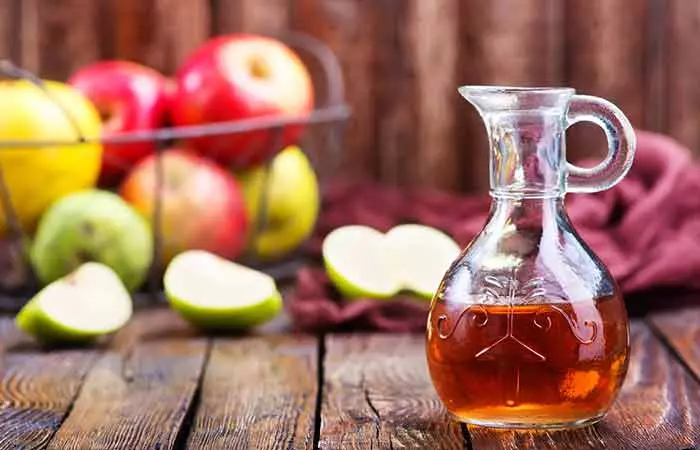
You Will Need
- 1 tablespoon of apple cider vinegar
- 1 teaspoon of honey
- 1/2 glass of warm water
What You Have To Do
- Add the apple cider vinegar to warm water.
- To this, add half a teaspoon of honey and mix well.
- Consume this mixture throughout the day.
How Often You Should Do This
Do this once a day.
Why This Works
Apple cider vinegar exhibits anti-inflammatory, antibacterial, antiviral, and antifungal properties that can help combat the bacteria and viruses causing pneumonia
 Quick Tip
Quick Tip2. Garlic
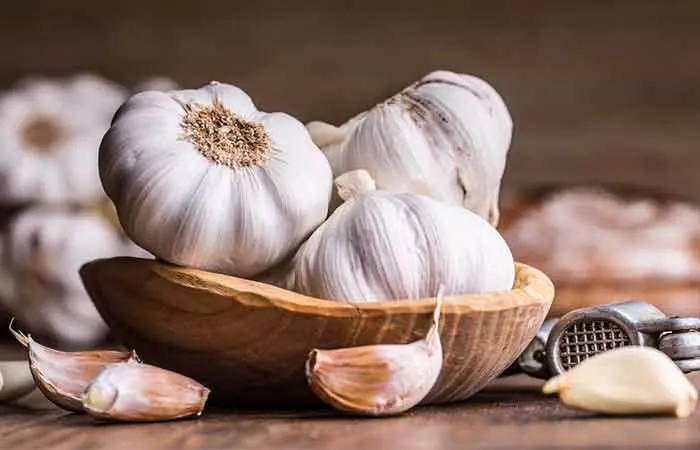
You Will Need
3-4 cloves of garlic
What You Have To Do
- You can either chew on the garlic cloves or add them to your hot soups and meals.
- You can also crush the garlic cloves and apply the paste to your chest.
How Often You Should Do This
Do this once daily.
Why This Works
Garlic is one of the best natural treatments for pneumonia.
It contains a compound called allicin that exhibits antibacterial and antifungal properties that help fight the infection (3), (4). It also acts as an expectorant and clears the phlegm from your lungs and throat.
3. Vitamin C
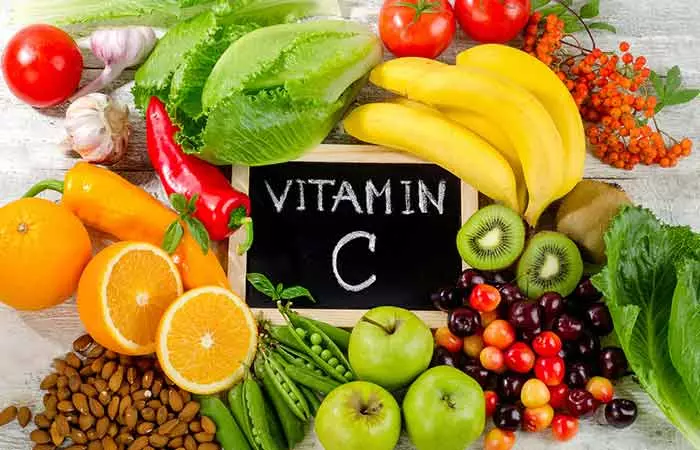
A deficiency in vitamin C can increase your chances of being affected by pneumonia (5). Vitamin C (ascorbic acid) is known for its antioxidant properties, and it also enhances the antibacterial properties of other substances (6), (7). These properties make it helpful in dealing with pneumonia and its symptoms.
You can increase your intake of vitamin C either via your daily diet or supplements. Foods such as citrus fruits, nuts, and leafy vegetables are rich sources of vitamin C. However, if you are planning to take additional supplements of vitamin C, it is recommended that you consult your doctor before doing so.
4. Essential Oils
1. Peppermint Oil
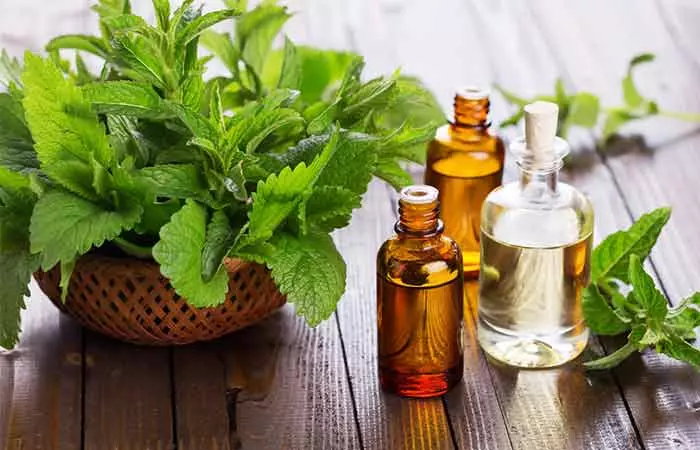
You Will Need
- 2-3 drops of peppermint oil
- 1 teaspoon of any carrier oil (olive or almond oil)
What You Have To Do
- Mix a few drops of peppermint oil with a carrier oil of your choice.
- Massage this mixture on your chest and back.
How Often You Should Do This
You must do this once daily.
Why This Works
Aromatherapy oils like peppermint oil exhibit antimicrobial and analgesici The property of a substance or drug to relieve pain without numbing the nerves or altering sensory perception. properties, which can help combat pneumonia (8). It is also a natural expectorant and can help in relieving congestion that often accompanies the infection, making it one of the best antibiotic alternatives you can use in treating pneumonia.
2. Eucalyptus Oil
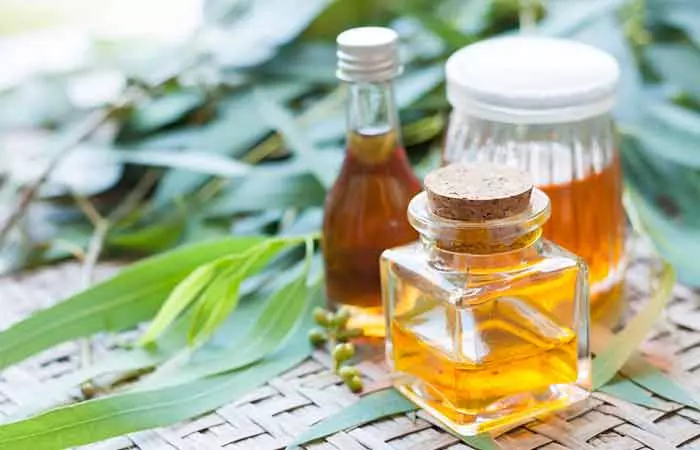
You Will Need
- 4-5 drops of eucalyptus oil
- A bowl of hot water
What You Have To Do
- Add a few drops of eucalyptus oil to a bowl of hot water.
- Cover your head with a blanket and bend over the bowl.
- Inhale the steam deeply.
How Often You Should Do This
Do this once a day for immediate relief.
Why This Works
Eucalyptus oil is derived from the leaves of the eucalyptus tree and is widely used for its medicinal properties. It has anti-inflammatory, analgesic, antibacterial, and decongestant properties, all of which can be helpful in the treatment of pneumonia (9), (10). Therefore, if you have been wondering how to stop coughing, give eucalyptus oil a try. You may also use it for fever management and inflammation reduction.
5. Turmeric
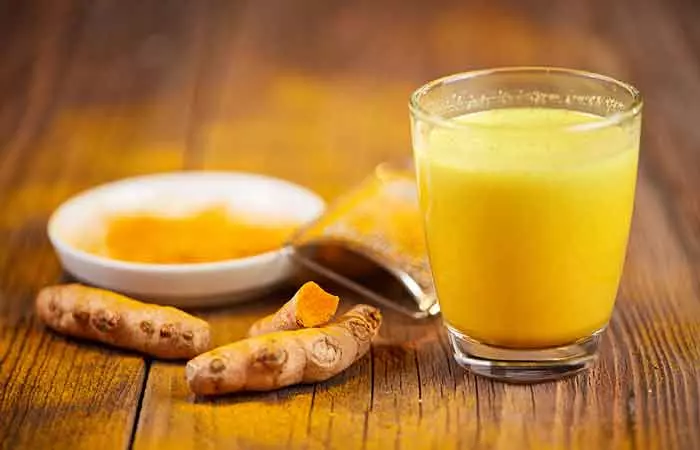
You Will Need
- 1 teaspoon of turmeric powder
- 1 glass of hot milk, preferably almond, coconut or rice milk (please avoid dairy milk, like that of cows, as it can increase mucous production)
What You Have To Do
- Mix the turmeric powder in a glass of hot milk.
- Stir well and consume daily.
How Often You Should Do This
Do this at least once daily.
Why This Works
Turmeric contains curcumin, a compound that exhibits anti-inflammatory and antimicrobial properties, which can be effective against the bacteria causing pneumonia (11), (12). It also acts as a mucolytic, which means it helps to expel mucus and catarrh from the bronchial ducts, thus easing breathing.
6. Ginger
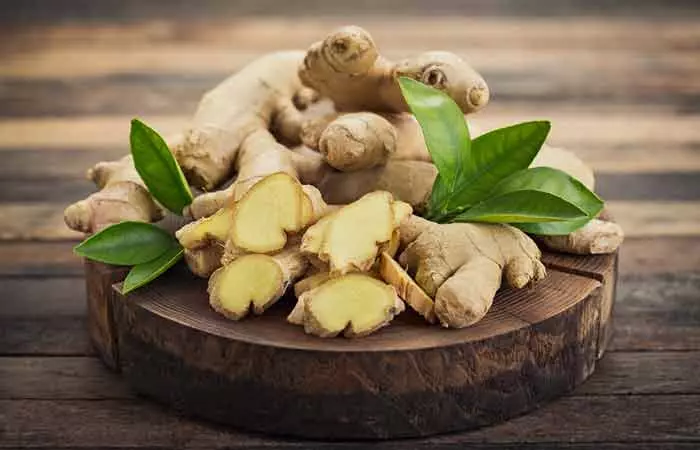
You Will Need
- 1-2 inches of ginger
- 1 cup of hot water
- Honey (optional)
- Lemon juice (optional)
What You Have To Do
- Add ginger to a cup of hot water
- and allow it to steep for 5 to 10 minutes.
- Strain and add honey and lemon juice to taste.
How Often You Should Do This
Drink this 2-3 times daily.
Why This Works
Ginger is another herb that can help treat pneumonia naturally. With its anti-inflammatory and antibacterial properties, ginger is capable of fighting the infectious microbes that cause pneumonia (13), (14).
7. Vegetable Juices
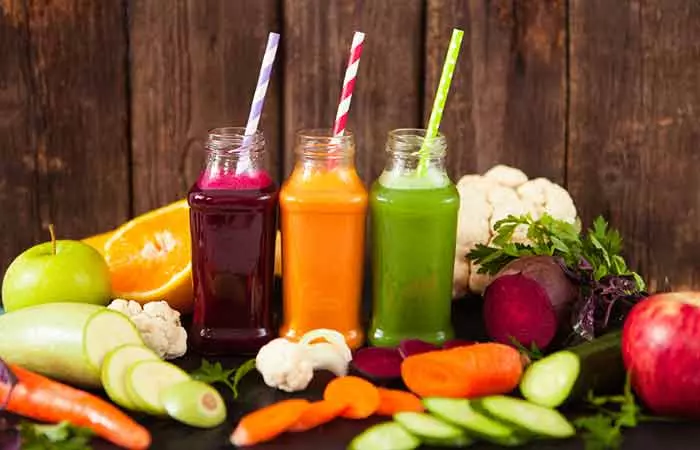
Many vegetable juices are capable of increasing your immunity and accelerating your recovery from this contagious infection. Juices extracted from cucumber, spinach, carrots, and beetroots do not just improve your overall health but also combat the bacteria and viruses causing pneumonia (15).
8. Vicks Vapo Rub
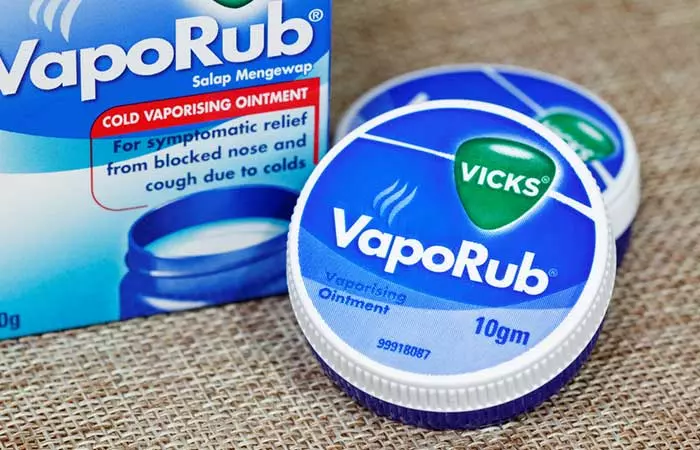
You Will Need
Vicks VapoRub
What You Have To Do
Rub a generous amount of Vicks VapoRub on your chest and back before you go to bed.
How Often You Should Do This
Do this once daily.
Why This Works
Vicks VapoRub contains camphor, menthol, and eucalyptus, all of which are effective in treating pneumonia. Studies have also proven that Vicks VapoRub exhibits decongestant properties, which can help relieve the symptoms of congestion that often surfaces with pneumonia (16).
9. Parsnip Juice
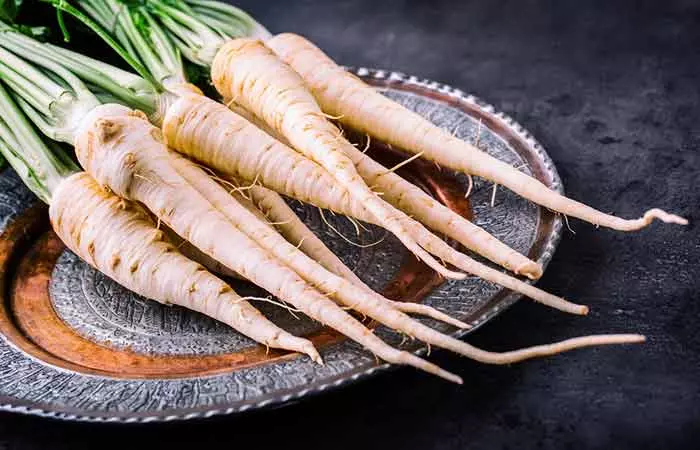
You Will Need
1/2 cup of parsnip juice
What You Have To Do
Consume about half a cup of parsnip juice.
How Often You Should Do This
Do this once daily.
Why This Works
Parsnip has high vitamin content, which helps to increase your immunity against all diseases in general. The vitamin C content of parsnips makes it effective against various respiratory diseases, including pneumonia (17).
10. Holy Basil
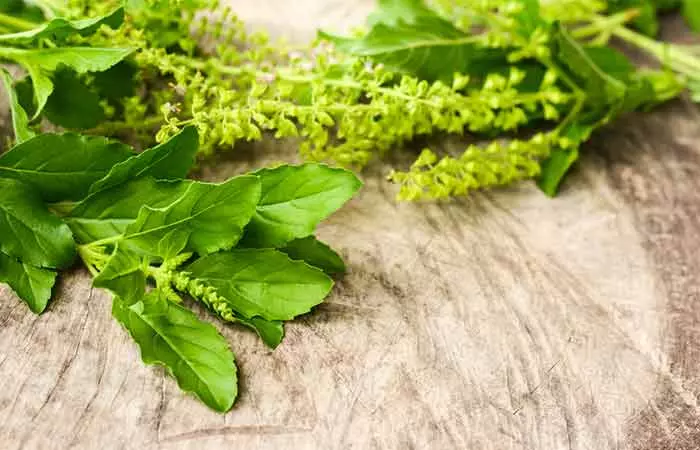
You Will Need
3-4 basil leaves
What You Have To Do
Chew on some basil leaves.
How Often You Should Do This
You can do this 2-3 times every day.
Why This Works
Herbs like holy basil exhibit anti-inflammatory and antioxidant properties that can help your body fight pneumonia (18).
11. Carrots

You Will Need
1 cup of chopped carrots
What You Have To Do
Eat a cup of carrots.
How Often You Should Do This
Do this 1-2 times every day.
Why This Works
Carrots are a rich source of fiber, vitamins, and minerals. They exhibit antioxidant and antimicrobial properties that can combat the microbes causing pneumonia (19), (20). The vitamins A and C in carrots improve your overall health and speed up your recovery.
12. Fenugreek Seeds
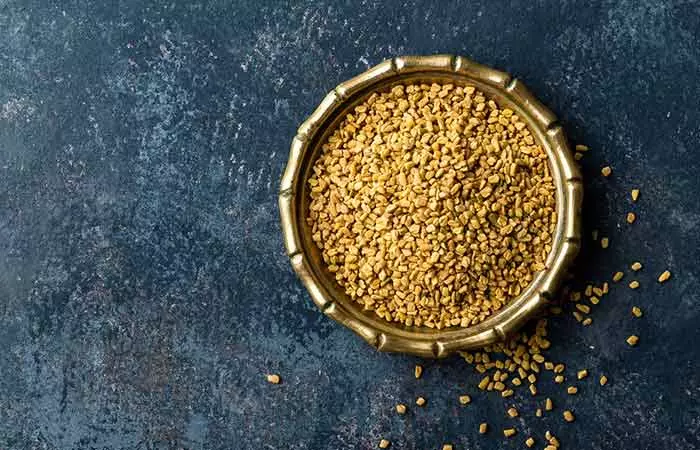
You Will Need
- 1 teaspoon of fenugreek seeds
- 1 cup of hot water
- Honey (optional)
What You Have To Do
- Steep the fenugreek seeds in hot water for 10 minutes.
- Strain and add honey for flavor.
- Consume the fenugreek tea before it turns cold.
How Often You Should Do This
You must drink this tea 2 to 3 times daily.
Why This Works
Fenugreek seeds are potential therapeutic agents for treating a variety of diseases (21). They exhibit some powerful anti-inflammatory properties, which can help relieve inflammation and other symptoms of pneumonia (22).
13. Sesame Seeds
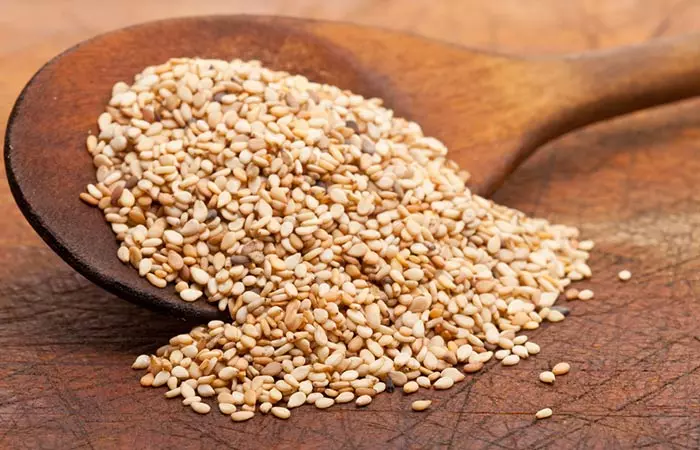
You Will Need
- 1 tablespoon of sesame seeds
- 1 cup of water
- 1 teaspoon of honey
- A pinch of salt
What You Have To Do
- Add the sesame seeds and water to a saucepan and bring it to a boil.
- Allow it to simmer for 5 minutes.
- Strain and add salt and honey.
- Consume this concoction before it turns cold.
How Often You Should Do This
Drink this solution once daily.
Why This Works
Sesame seeds contain phytoestrogensi They are estrogen-like compounds present naturally in plants and have a similar chemical structure to the estrogen hormone. that exhibit strong antimicrobial properties and help in the treatment of pneumonia. These seeds also possess expectorant properties. Therefore, you can use them if you are looking for home remedies for chest congestion. They may also help relieve other symptoms of the infection (23), (24).
14. Honey
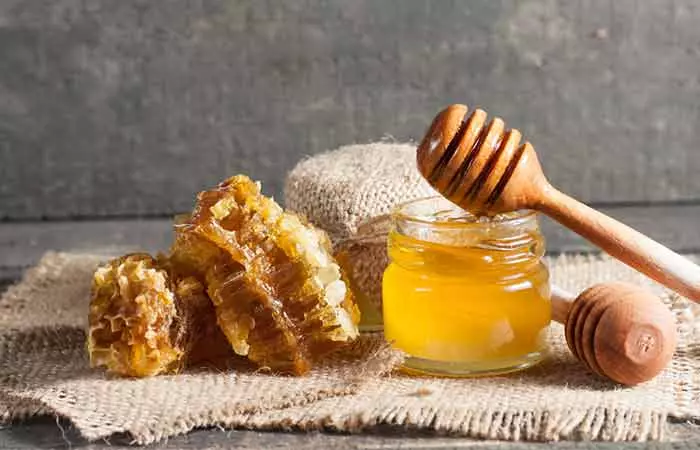
You Will Need
- 1 teaspoon of honey
- 1/4 glass of water
What You Have To Do
- Mix a teaspoon of honey in water.
- Consume this solution daily.
How Often You Should Do This
Do this several times every day till the symptoms subside.
Why This Works
Honey is a blend of compounds that impart antibacterial, antifungal, and antioxidant properties to it (25), (26). The exceptional medicinal properties of honey have been exploited since ages to treat various ailments, including cough and cold, which are often the symptoms of pneumonia (27).
15. Camphor
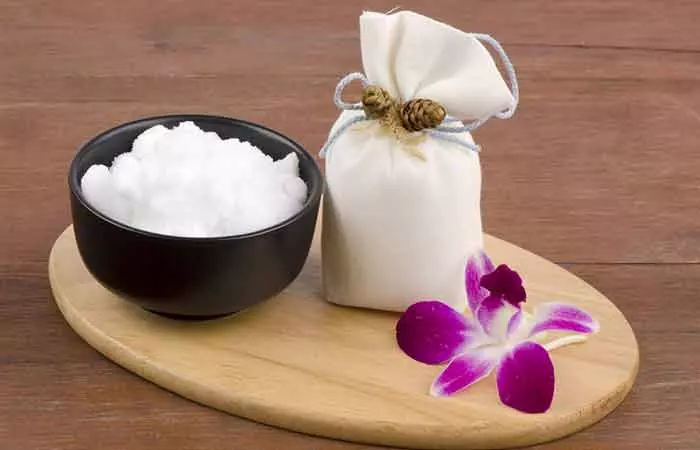
You Will Need
- 2-3 drops of camphor oil
- 1 teaspoon of any carrier oil (jojoba or olive oil)
What You Have To Do
- Add about three drops of camphor oil to a teaspoon of any carrier oil.
- Rub this mixture gently on your chest and back.
How Often You Should Do This
Do this every night before going to bed.
Why This Works
The powerful antiseptic and decongestant properties of camphor oil can help relieve the symptoms of pneumonia (28).
Caution
Keep this out of your child’s reach.
16. Oregano Oil
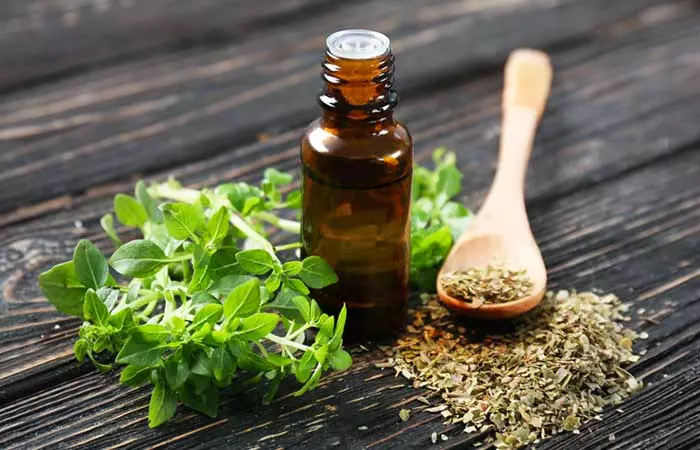
You Will Need
- 1-2 drops of oregano oil
- A cotton ball
What You Have To Do
- Take a few drops of oregano oil on a cotton ball.
- Place it next to your bed every night before going to sleep.
How Often You Should Do This
You can do this on a regular basis.
Why This Works
Oregano oil possesses antibacterial, antiviral, and antifungal properties, which make it effective in fighting pneumonia (29), (30). It also exhibits decongestant properties, which can be helpful in breaking up the phlegm and relieving cough and congestion.
17. Dandelion Tea
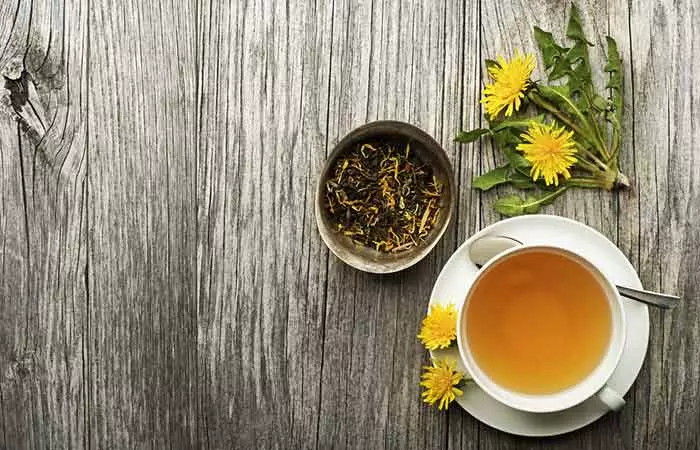
You Will Need
- 1-2 teaspoons of dandelion herb
- 1 cup of hot water
- Honey (optional)
What You Have To Do
- Add the dandelion herb to a cup of hot water.
- Let it steep for 5 to 10 minutes.
- Strain and add honey to this.
- Consume the dandelion tea.
How Often You Should Do This
Do this 3-4 times daily.
Why This Works
Dandelion roots are widely used for their health benefits. Apart from being anti-inflammatory, they also exhibit antimicrobial properties, which can be effective against various microbes like bacteria, viruses, and fungi (31), (32). This makes herbal teas like dandelion tea quite helpful in the treatment of pneumonia. They also exhibit decongestant properties that can help relieve cough and other symptoms of pneumonia.
18. Apples
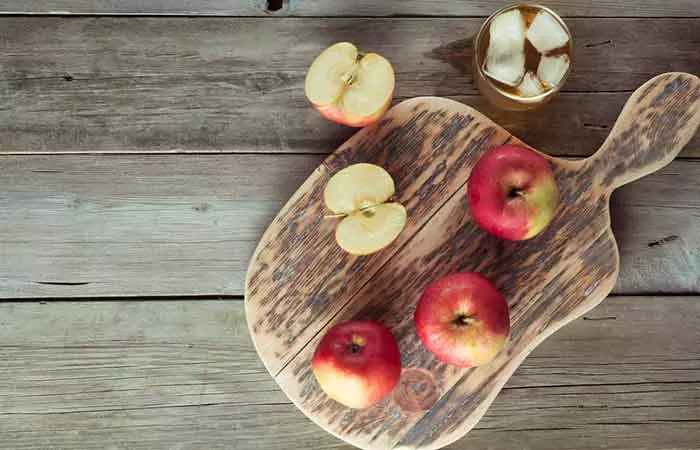
You Will Need
- 1 apple
- Water (optional)
What You Have To Do
- Have an apple for breakfast or as a snack.
- Alternatively, you can blend an apple with a cup of water and drink the juice.
How Often You Should Do This
Consume apples on a daily basis.
Why This Works
Apples are rich in fiber and vitamin C, which enhance your overall health and also help in treating and preventing pneumonia. The phytochemicals and flavonoidsi A group of polyphenolic compounds that have antioxidant properties and protect against diseases and cell damage. in apples have anti-inflammatory properties and can help in reducing inflammation in the lungs (33), (34).
19. Willow Bark
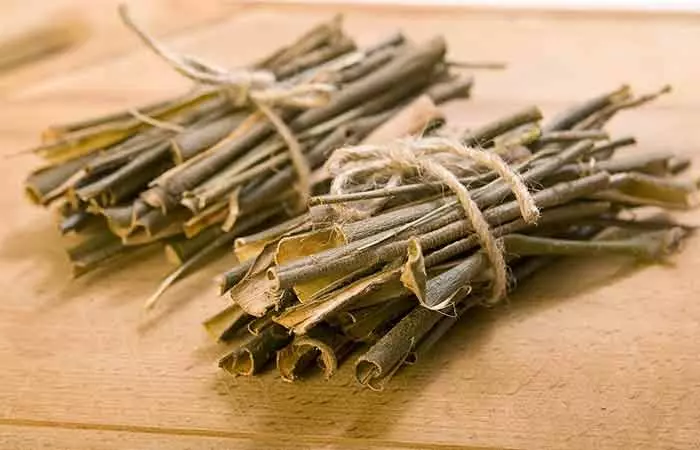
You Will Need
- 1-2 teaspoons of willow bark
- 1 cup of hot water
- Honey
What You Have To Do
- Steep willow bark in a cup of hot water.
- Strain the solution and add honey to it.
- Consume this before it turns cold.
How Often You Should Do This
You must drink this solution at least thrice every day.
Why This Works
Willow barks contain polyphenolsi A family of naturally occurring micronutrients with antioxidant properties commonly found in fruits, teas, spices, and vegetables. and flavonoids that have antiseptic and fever-reducing properties (35). These compounds also improve your overall immunity. Hence, willow bark is a great option for treating pneumonia.
20. Steam Inhalation
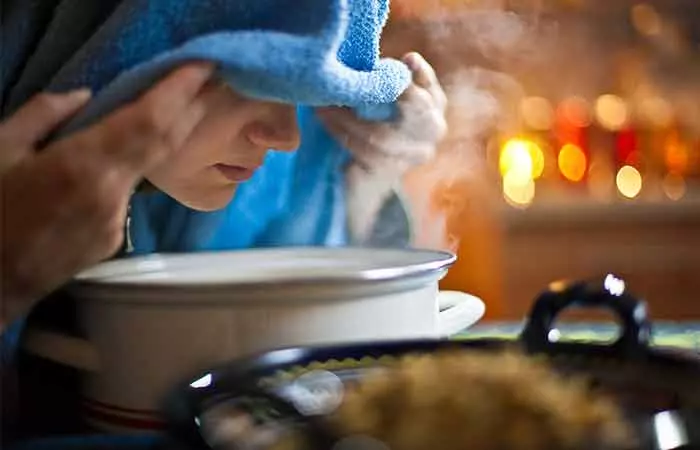
You Will Need
- A bowl of hot water
- A towel
What You Have To Do
- Take a bowl of hot water and bend your head over it.
- Cover your head with a towel and inhale the hot steam.
- You can also add essential oils like eucalyptus or peppermint oil to your steam therapy for quick healing and recovery.
How Often You Should Do This
You can do this 1-2 times daily.
Why This Works
The hot steam from water can help relieve cough and congestion by breaking up the phlegm in your lungs. It is also antimicrobial and kills the microbes causing the infection (36). You may also add chamomile extract to the steam to relieve symptoms of common cold symptoms that may lead to pneumonia (37). However, more studies are warranted to support this claim.
21. Humidifiers
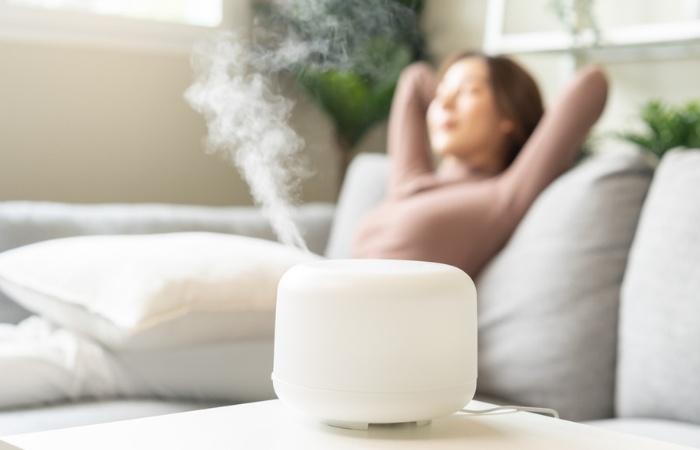
- A humidifier
- Distilled water
What You Have To Do
- Fill the humidifier’s tank with the distilled water.
- Place the humidifier in the room where the individual with pneumonia is resting. Ensure it is stable and does not leak.
- Adjust the settings to maintain the desired level of humidity in the room. The optimal indoor humidity level is around 40–50%.
- Let the humidifier run continuously or as per the manufacturer’s instructions.
How Often You Should Do This
Run it for 12 hours daily.
Why This Works
Using a humidifier can help ease the symptoms of pneumonia by creating moisture in the air. This can soothe the irritated airways and make it easier for the individual to breathe. Using a humidifier may also help improve breathing in individuals who exhibit viscous sputum (38).
 Quick Tip
Quick TipPneumonia, when treated in its early stages, can be easily treated by using the above home remedies. You can also take some preventive tips to avoid the recurrence of this infection. Administration of home remedies for pneumonia in humans with the risk of other comorbidities such as diabetes, kidney-related issues, or any major ailments should be followed up with a physician.
Preventive Tips
- When recovering from pneumonia, maintaining hydration is essential. Adequate intake of water thins mucus, allowing its removal and improving lung function. Drink clear broths, herbal teas, and eight to ten glasses of water per day.
- Quit smoking as it makes you more susceptible to respiratory infections.
- Wash your hands, especially before and after having your meals.
- Cover your nose and mouth while coughing and sneezing to avoid spreading your infection.
- Follow a healthy diet rich in probiotics, vitamins, and minerals to fulfill your body’s nutrition and hydration needs.
- Practice breathing and relaxation techniques and exercises in fresh air and get ample rest to increase your immunity.
- There are also vaccinations available for pneumonia. Although these might not prevent pneumonia altogether, they will surely lower the risk of complications.
In addition to these prevention tips, it is important to be aware of the risk factors for pneumonia.
Risk Factors For Pneumonia
Certain groups of people are more susceptible to developing pneumonia and are at higher risk of suffering from its complications. They include
- Newborn infants and children whose age is 2 years or less.
- Individuals above 65 years of age.
- Those under medications or already suffering from any disease are at a higher risk due to their weakened immunity.
- Smokers and people who misuse drugs also have a higher probability of developing pneumonia.
Infographic: What To Expect While Recovering From Pneumonia
Pneumonia is a microbial infection that may become worse if not appropriately managed. Though minor symptoms like cough and fever can be managed with home remedies like steam therapy, you may have to consult a doctor if the symptoms do not subside. You will start seeing changes in the symptoms within a week of starting your treatment.
Check out the infographic below to learn what to expect while recovering from pneumonia.
Some thing wrong with infographic shortcode. please verify shortcode syntax
Pneumonia is a microbial infection of the lungs that can affect breathing and lung functioning. You are more likely to develop pneumonia if you are battling the flu, a cold or have underlying health conditions like diabetes or asthma. Some common signs and symptoms to look out for include productive cough, chest pain, wheezing, and breathing difficulties. As this condition can quickly progress and become a medical emergency, it is best to stay in touch with your healthcare provider and begin the use the home remedies to treat pneumonia at the earliest.
Frequently Asked Questions
How is pneumonia spread?
The microbes that cause pneumonia are spread by infected individuals via food, air, and water.
How long does it take to recover from pneumonia?
Pneumonia usually lasts anywhere between 1 to 3 weeks.
What types of doctors treat pneumonia?
A general physician or lung health specialist usually treats pneumonia.
Does pneumonia cause a breathing problem?
The microbes that cause pneumonia usually affect an individual’s lungs and air sacs. This leads to inflammation of the lungs, accompanied by a severe cold and cough, and breathing difficulties in some cases.
What is the difference between pneumonia and bronchitis?
In pneumonia, the lungs are inflamed and filled with fluid, whereas, in bronchitis, the air passages are inflamed.
Is it dangerous to have pneumonia during pregnancy?
Pneumonia, by itself, is a serious illness and can also have life-threatening consequences. Hence, it could prove to be quite dangerous during pregnancy and must be tried and avoided at all costs.
Is pneumonia contagious?
If pneumonia is caused by bacteria or viruses, it is contagious. However, pneumonia caused by fungi is not contagious.
How is pneumonia diagnosed?
Pneumonia can be diagnosed by your doctor with the help of a simple physical examination using a stethoscope. If your lungs make bubbling and rumbling noises when you inhale, it is a sign that you are infected with pneumonia.
Which age group is most commonly affected by pneumonia?
Pneumonia is more common among infants younger than 1 year and individuals older than 65 years of age.
Is walking good for pneumonia?
Yes. Walking keeps the lungs healthy and may help prevent pneumonia. Studies indicate that walking may reduce pneumonia-related mortality in older adults (39).
Illustration: Home Remedies To Treat Pneumonia And Preventive Tips

Image: Dall·E/StyleCraze Design Team
Treat the onset of pneumonia at home. Get relief from coughing, chest pain, and fever by learning 3 simple home remedies. Watch this video now to ease the symptoms!
Personal Experience: Source
StyleCraze's articles are interwoven with authentic personal narratives that provide depth and resonance to our content. Below are the sources of the personal accounts referenced in this article.
i. How pneumonia changed my lifehttps://jenniferschmidtwrites.medium.com/how-pneumonia-changed-my-life-fa79d138edc2
References
Articles on StyleCraze are backed by verified information from peer-reviewed and academic research papers, reputed organizations, research institutions, and medical associations to ensure accuracy and relevance. Read our editorial policy to learn more.
- Vinegar: Medicinal Uses and Antiglycemic Effect
https://www.ncbi.nlm.nih.gov/pmc/articles/PMC1785201/ - Apple Cider Vinegar Recipes For Health
https://books.google.co.in/books?id=3aD1AAAAQBAJ&printsec=frontcover#v=onepage&q&f=false - Antimicrobial properties of allicin from garlic
https://pubmed.ncbi.nlm.nih.gov/10594976/ - Antibacterial potential of garlic-derived allicin and its cancellation by sulfhydryl compounds
https://pubmed.ncbi.nlm.nih.gov/19734685/ - Vitamin C for preventing and treating pneumonia
https://pubmed.ncbi.nlm.nih.gov/23925826/ - Vitamin C Pretreatment Enhances the Antibacterial Effect of Cold Atmospheric Plasma
https://www.ncbi.nlm.nih.gov/pmc/articles/PMC5319976/ - Vitamin C in Disease Prevention and Cure: An Overview
https://www.ncbi.nlm.nih.gov/pmc/articles/PMC3783921/ - Antibacterial and antifungal activity of ten essential oils in vitro
https://pubmed.ncbi.nlm.nih.gov/8893526/ - Antibacterial activity of the essential oils from the leaves of Eucalyptus globulus against Escherichia coli and Staphylococcus aureus
https://www.ncbi.nlm.nih.gov/pmc/articles/PMC3609378/ - Analgesic and anti-inflammatory effects of essential oils of Eucalyptus
https://pubmed.ncbi.nlm.nih.gov/14611892/ - A Review on Antibacterial Antiviral and Antifungal Activity of Curcumin
https://www.ncbi.nlm.nih.gov/pmc/articles/PMC4022204/ - Antioxidant and anti-inflammatory properties of curcumin
https://pubmed.ncbi.nlm.nih.gov/17569207/ - Antibacterial activity of [10]-gingerol and [12]-gingerol isolated from ginger rhizome against periodontal bacteria
https://pubmed.ncbi.nlm.nih.gov/18814211/ - Anti-Oxidative and Anti-Inflammatory Effects of Ginger in Health and Physical Activity: Review of Current Evidence
https://www.ncbi.nlm.nih.gov/pmc/articles/PMC3665023/ - Health Benefits of Fruits and Vegetables
https://www.ncbi.nlm.nih.gov/pmc/articles/PMC3649719/ - Vapor Rub Petrolatum and No Treatment for Children With Nocturnal Cough and Cold Symptoms
https://www.ncbi.nlm.nih.gov/pmc/articles/PMC3600823/ - Fruit and Vegetable Processing: Improving Quality
https://books.google.co.in/books?id=Jq-jAgAAQBAJ&printsec=frontcover#v=onepage&q&f=false - Anti-inflammatory and antioxidative activity of anthocyanins from purple basil leaves induced by selected abiotic elicitors
https://pubmed.ncbi.nlm.nih.gov/25442525/ - Drinking carrot juice increases total antioxidant status and decreases lipid peroxidation in adults
https://www.ncbi.nlm.nih.gov/pmc/articles/PMC3192732/ - Antimicrobial activity of shredded carrot extracts on food-borne bacteria and yeast
https://pubmed.ncbi.nlm.nih.gov/8144415/ - Investigating Therapeutic Potential of Trigonella foenum-graecum L. as Our Defense Mechanism against Several Human Diseases
https://www.ncbi.nlm.nih.gov/pmc/articles/PMC4739449/ - Anti-inflammatory activity of fenugreek (Trigonella foenum-graecum Linn) seed petroleum ether extract
https://www.ncbi.nlm.nih.gov/pmc/articles/PMC4980935/ - Synergistic Antimicrobial Activities of Phytoestrogens in Crude Extracts of Two Sesame Species Against Some Common Pathogenic Microorganisms
https://www.ncbi.nlm.nih.gov/pmc/articles/PMC2816499/ - [Nutritional value of sesame seeds]
https://pubmed.ncbi.nlm.nih.gov/21842753/ - Antimicrobial properties of honey
https://pubmed.ncbi.nlm.nih.gov/23782759/ - Honey: its medicinal property and antibacterial activity
https://www.ncbi.nlm.nih.gov/pmc/articles/PMC3609166/ - A spoonful of honey helps a coughing child sleep
https://www.ncbi.nlm.nih.gov/pmc/articles/PMC3601686/ - Antimicrobial Properties of Plant Essential Oils against Human Pathogens and Their Mode of Action: An Updated Review
https://www.ncbi.nlm.nih.gov/pmc/articles/PMC5206475/ - Bio-efficacy of the essential oil of oregano (Origanum vulgare Lamiaceae. Ssp. Hirtum)
https://pubmed.ncbi.nlm.nih.gov/25266989/ - Antiviral efficacy and mechanisms of action of oregano essential oil and its primary component carvacrol against murine norovirus
https://pubmed.ncbi.nlm.nih.gov/24779581/ - Characterisation of antimicrobial extracts from dandelion root (Taraxacum officinale) using LC-SPE-NMR
https://pubmed.ncbi.nlm.nih.gov/25644491/ - Discovery of novel antimicrobial peptides with unusual cysteine motifs in dandelion Taraxacum officinale Wigg. flowers
https://pubmed.ncbi.nlm.nih.gov/22640720/ - Apple phytochemicals and their health benefits
https://www.ncbi.nlm.nih.gov/pmc/articles/PMC442131/ - Flavonoids as bioactive components in apple products
https://www.sciencedirect.com/science/article/abs/pii/S0304383597046375 - Willow bark extract: the contribution of polyphenols to the overall effect
https://pubmed.ncbi.nlm.nih.gov/17704985/ - Heated humidified air for the common cold
https://pubmed.ncbi.nlm.nih.gov/11687118/ - Chamomile: A herbal medicine of the past with bright future
https://www.ncbi.nlm.nih.gov/pmc/articles/PMC2995283/ - Humidifier use and prone positioning in a patient with severe covid-19 pneumonia and endotracheal tube impaction due to highly viscous sputum
https://www.ncbi.nlm.nih.gov/pmc/articles/PMC7296879/ - Can Daily Walking Alone Reduce Pneumonia-Related Mortality among Older People?
https://www.ncbi.nlm.nih.gov/pmc/articles/PMC7244731/
Read full bio of Dr. Abby Kramer
Read full bio of Shaheen Naser
Read full bio of Arshiya Syeda
Read full bio of Dipti Sharma






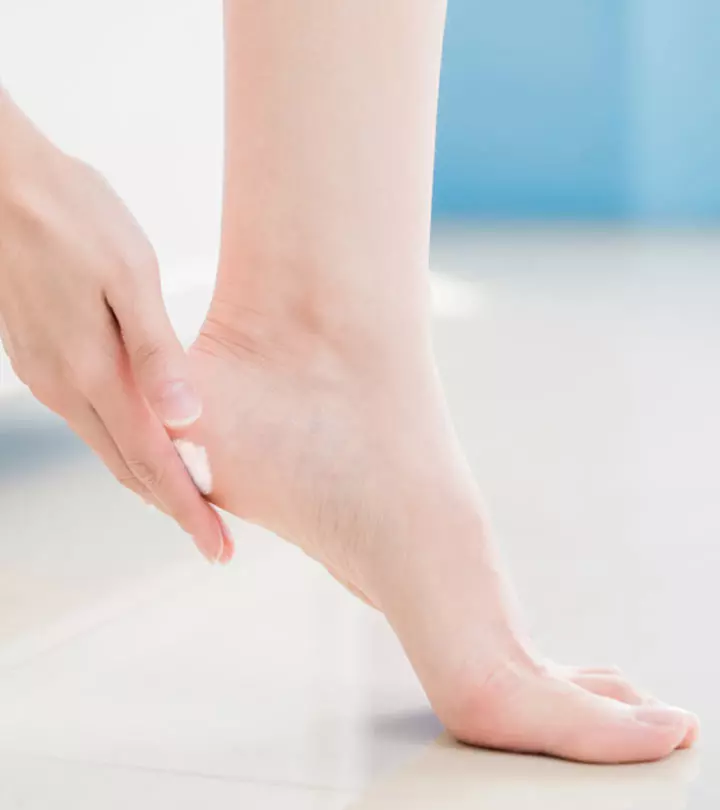

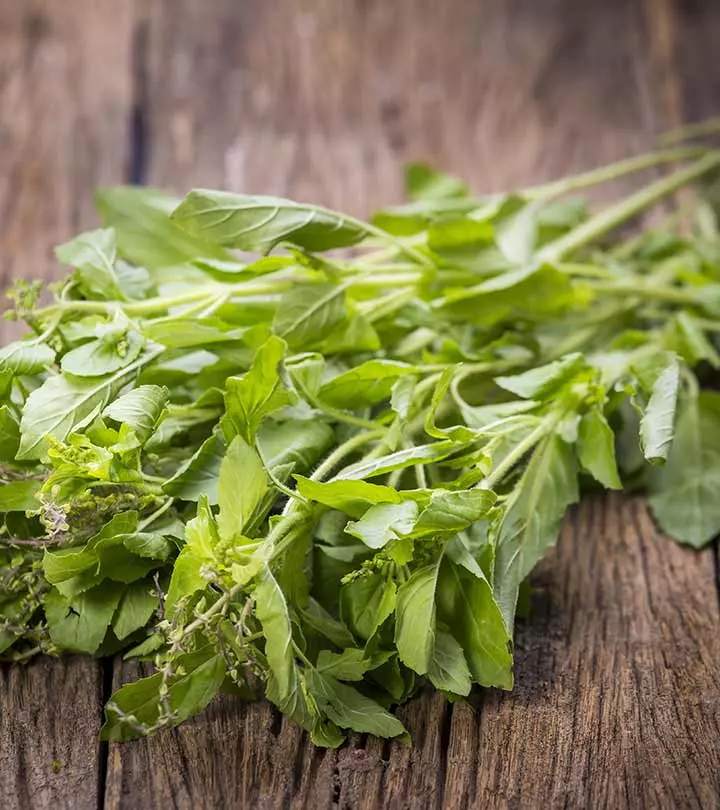


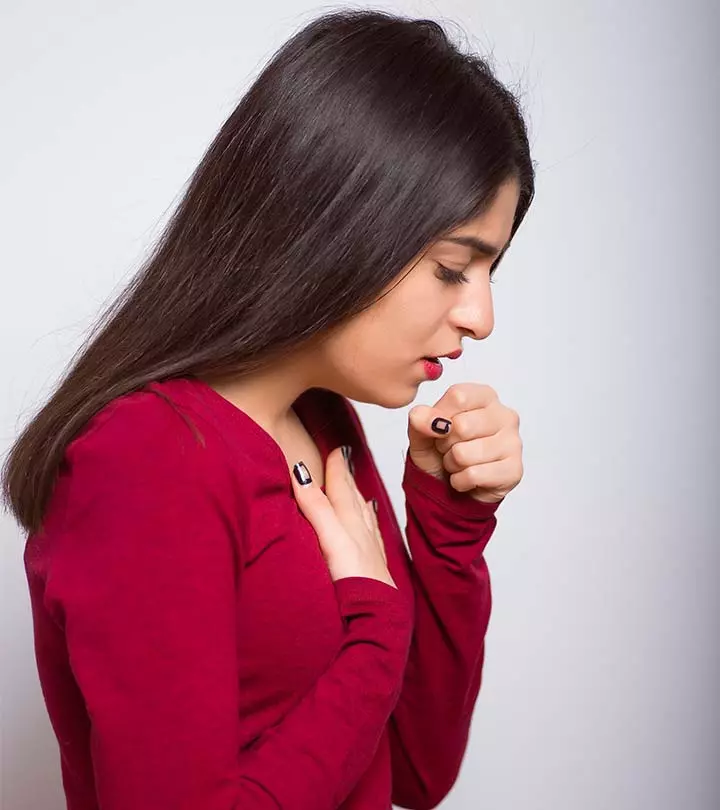


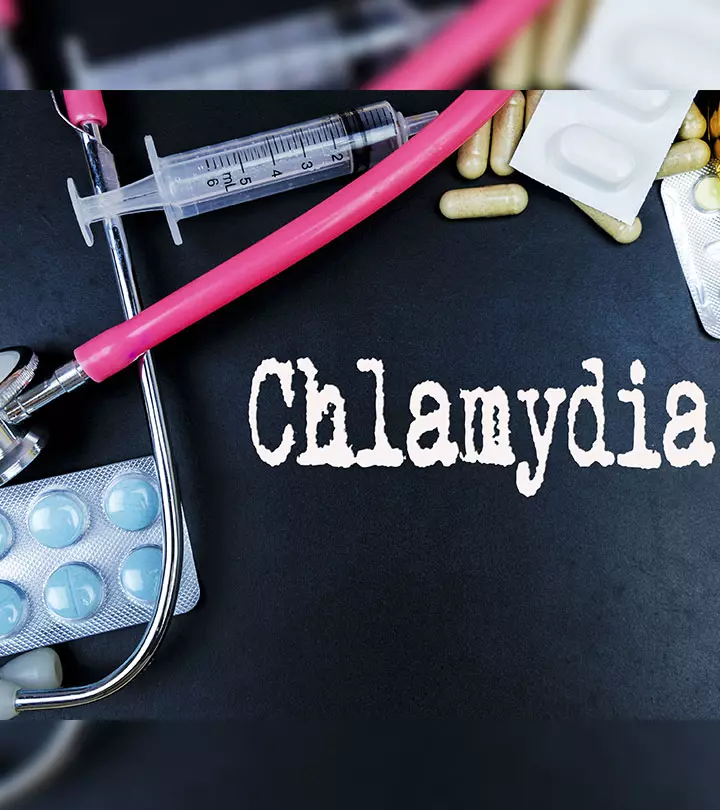


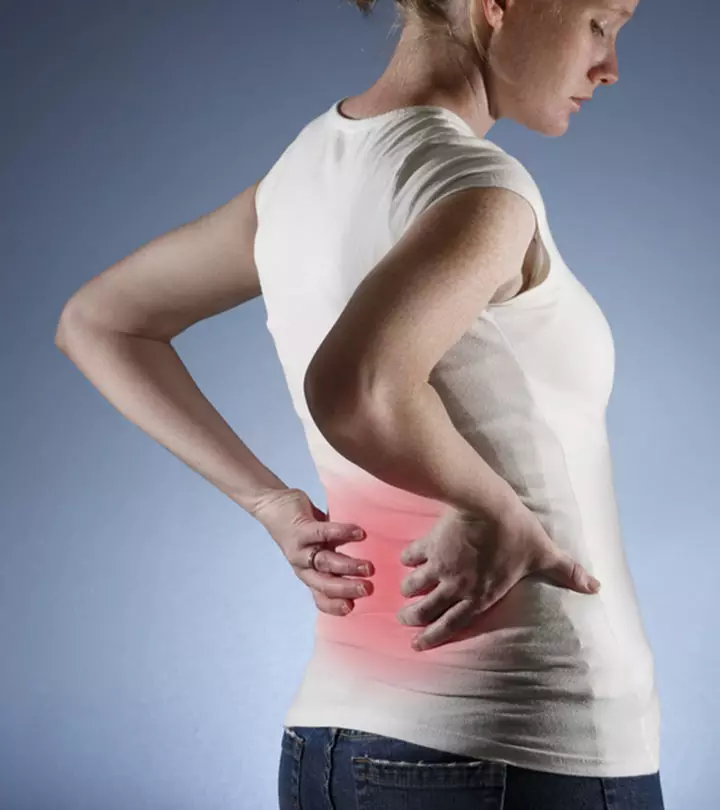





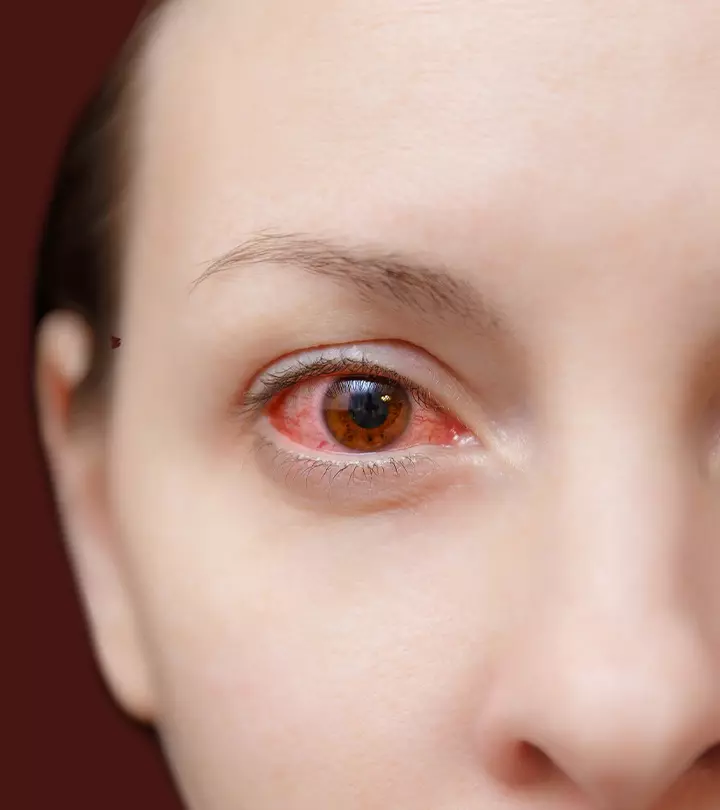


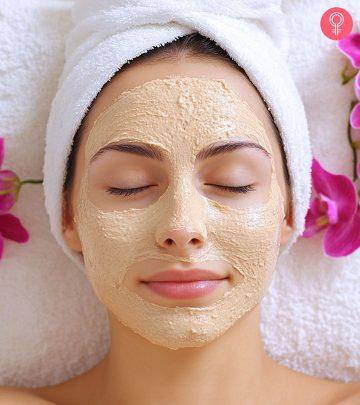
Community Experiences
Join the conversation and become a part of our empowering community! Share your stories, experiences, and insights to connect with other beauty, lifestyle, and health enthusiasts.